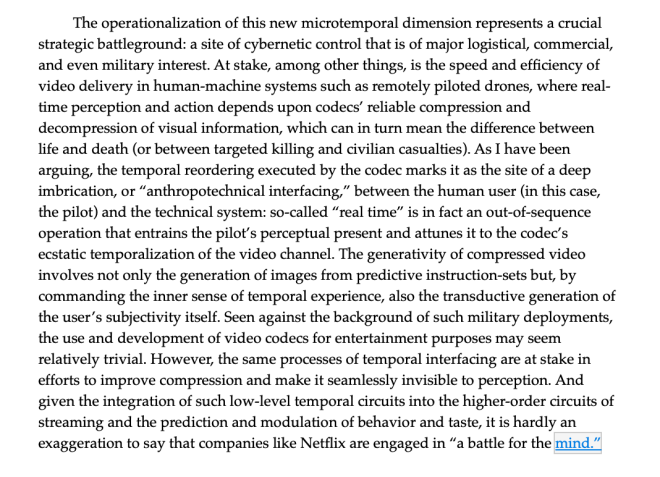
I quipped the other day on Facebook, “Thank god blogs are dead!” — thinking of some particularly toxic moments and scenes from “back in the day.” Facebook must have heard me… I wanted to post the rough scrap of writing above to that piece of … social media today (with the clever caption: “Brian O’Blivion makes a surprise cameo appearance in my book! Was not expecting this…”), but FB won’t accept my image or post my comment. I know that the network is having major difficulties today, difficulties that will likely pass quickly, but this episode has gotten me thinking (somewhat romantically) about the possibility of a different Internet. The blogosphere was often horrible, but could it ever be as bad as Facebook? Could #FacebookDown and #InstagramDown spark a mass migration and a revival of blogs? Probably not… But leave a comment if you’d like to see it happen! (Or if not, why not.)
I certainly would like to see a rejuvenation of blogging culture.
Hi Kian, thanks for commenting (almost said “thanks for playing”) — let’s see what happens!
A powerful passage, Shane, thanks for posting. You are definitely going to want to check out Kyle Stine’s new article in Critical Inquiry where he describes quite well the discorrelated circuit of image and data that you allude to here
https://www.journals.uchicago.edu/doi/abs/10.1086/702614
Thanks, Jason! I look forward to reading that piece! (And to see where this experiment leads… Thanks for playing along!)
Hey Shane,
Coincidentally this has been on my mind as well (more exactly whether blogging all these years would have been, for me, either an alternative or a complementary practice to my extensive note taking and written explorations). Perhaps, paired with RSS feeds, blogging could be a more directed alternative to the Facebook post and feed. Sharing snippets of what one is working on, as you have been doing, appeals to me as a way to maintain a communal scholarly practice that is more informal and impromptu than the official forums (conferences, journal submissions, university events). The challenge, for me, would be to integrate it without it demanding more time. Really, though, the issue of time demand and brain strain would emerge when receiving an overwhelming barrage of blog posts, not with posting. I would, in that scenario, probably recede to the privacy of reading published texts and writing my thoughts. If there were fewer publications, however, in response to an ecology of blogs that served as a clearing ground for working through ideas, then that might be a sustainable activity.
Hi David! Those are good questions, and I am not sure about the place of blogging in those other (more private) practices of thinking in writing. And I certainly think you’re right to raise the question of the time sink. I know I wasted a lot of time reading blogs while I was writing my dissertation, and I probably could have used a lot of that time more productively. These days, since blogs are basically dead, maybe there’s actually a way to develop more limited ecologies of blogs. Anyway, none of this will happen, but I don’t doubt that something else will happen, and Facebook cannot be the future…
I’ve added your blog to my RSS feed. I’ll let you know if event announcements across the country drive me bonkers!
Saw Alex Galloway talk yesterday at UNC about digital/analog thinking. During the Q&A, a friend of mine asked him about his recent blogging habits (do you see this as a form of public humanities scholarship? Does it fit into your intellectual development?) Alex said he doubted blogging would return to the level of “the blogosphere,” and that no one uses RSS anymore. Au contraire! I think RSS is a great way to manage news and criticism consumption habits. By the way, I don’t recall exactly what Alex’s motivation was for picking up blogging specifically. Since he’s under no pressure to write for an audience, so the benefits of just writing to figure out what one is thinking could be done in any private format.